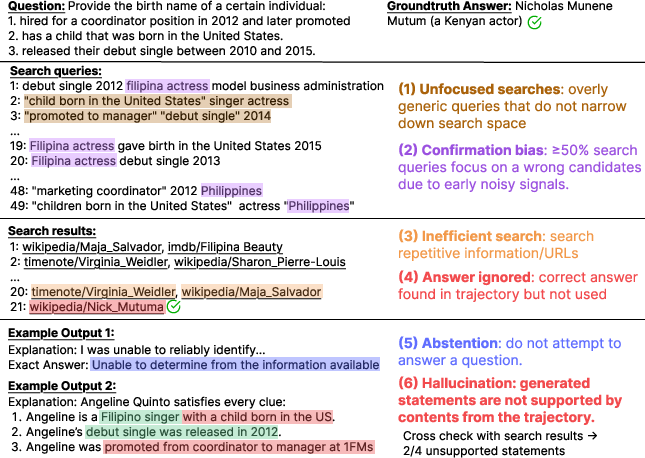- The paper presents Slim, a framework that separates search and browse functions with regular summarization to overcome context limitations in long-horizon tasks.
- It shows superior performance on benchmarks like BrowseComp and HLE by reducing tool calls and overall costs compared to existing systems.
- The study also introduces a trajectory-level error taxonomy, offering insights into failure modes such as hallucinations and unfocused search results.
Overcoming Context Limitations in Long-Horizon Agentic Search
Introduction
The paper "Lost in the Maze: Overcoming Context Limitations in Long-Horizon Agentic Search" addresses a critical challenge faced by agentic search frameworks: the ability to scale searches over long trajectories while managing the context effectively. The authors introduce a new framework named Slim, which separates retrieval tasks into distinct search and browse tools, coupled with periodic summarization, aiming to keep contexts concise and focused while enabling longer search processes.
Problem Statement
Agentic search frameworks are pivotal for complex applications like deep research systems, which require synthesizing information across extended web trajectories. Existing systems often encounter context limitations, accumulating noisy content that fills the context window, hits tool budgets, or ends prematurely. These limitations significantly affect performance in long-horizon tasks such as those tested on benchmarks like BrowseComp.
Slim Framework
Slim is introduced as a straightforward yet effective framework comprising three core components: search, browse, and summarization.
- Search Tool: Unlike existing frameworks that bundle search and browse functionalities, Slim’s search tool returns a concise snippet from the top-ranked search results, minimizing context noise and enabling focus on relevant information.
- Browse Tool: The browse tool complements the search functionality by allowing deeper exploration of promising search results, selectively retrieving sections of web content most relevant to the query.
- Summarization Module: To efficiently manage context size over long trajectories, Slim periodically compresses the agent's context history into concise summaries, allowing scalability in trajectory length.

Figure 1: With o3 as the base model, Slim achieves better performance than existing frameworks on both BrowseComp and HLE while using more than 4-6x fewer tool calls and lower overall costs, which account for LLM token usage and tool costs.
Experimental Results
Experiments demonstrate Slim's superior performance across multiple benchmarks and base models. When using o3 as the base model, Slim outperforms existing open-source frameworks like Search-o1, achieving higher scores on BrowseComp and HLE benchmarks while incurring substantially fewer tool calls and overall costs.

Figure 2: With o4-mini as the base model, Slim consistently outperforms other baselines on BrowseComp while using fewer tool calls and lower overall costs. On HLE, Slim can achieve overall higher performance and use fewer tool calls.
Trajectory-Level Error Analysis
The research paper also introduces a novel trajectory-level error taxonomy and an automated analysis pipeline, allowing for fine-grained characterization of failure modes in agentic search frameworks. This analysis highlights Slim’s robustness to errors such as hallucinations and unfocused searches, providing insights into common pitfalls of other systems.

Figure 3: Examples of each trajectory-level failure mode on a BrowseComp sample.
Implications and Future Work
The work presented in this paper informs future developments in long-horizon agentic search systems by emphasizing streamlined tool designs and efficient context management strategies. The Slim framework serves as a promising baseline for further exploration in overcoming limitations inherent in existing systems. Future research could focus on enhancing the effectiveness of long-horizon search contexts and addressing limitations such as high abstention rates in certain scenarios.
Conclusion
"Lost in the Maze: Overcoming Context Limitations in Long-Horizon Agentic Search" successfully tackles the context management challenges of long-horizon search tasks. Through its simplified, innovative framework, Slim exemplifies improved performance metrics and tool efficiency, paving the way for more effective and scalable agentic search systems in complex applications. The analytical tools developed could serve as valuable resources for systematically understanding and improving upon existing limitations in agentic search technologies.




